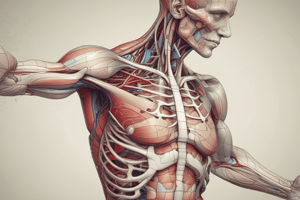Podcast
Questions and Answers
What is the primary function of the Circulatory System?
What is the primary function of the Circulatory System?
- Regulates body temperature
- Moves air into and out of the lungs
- Transports nutrients, wastes, hormones, and gases (correct)
- Defends against pathogens and disease
Which system extracts and absorbs nutrients from food?
Which system extracts and absorbs nutrients from food?
- Endocrine System
- Reproductive System
- Digestive System (correct)
- Nervous System
What is the function of the Endocrine System?
What is the function of the Endocrine System?
- Moves air in and out of the lungs
- Regulates body temperature and metabolism (correct)
- Produces gametes
- Removes wastes from blood
Which system is responsible for removing wastes from blood and regulating body fluids?
Which system is responsible for removing wastes from blood and regulating body fluids?
What is the main purpose of the Lymphatic System?
What is the main purpose of the Lymphatic System?
What function does the Integumentary System serve?
What function does the Integumentary System serve?
Which system moves limbs and contributes to body support?
Which system moves limbs and contributes to body support?
Which organ system regulates behavior and maintains homeostasis?
Which organ system regulates behavior and maintains homeostasis?
What is the role of the Reproductive System?
What is the role of the Reproductive System?
What is the main function of the Respiratory System?
What is the main function of the Respiratory System?
What does the Skeletal System do?
What does the Skeletal System do?
Flashcards
Circulatory System
Circulatory System
Transports nutrients, wastes, hormones, and gases throughout the body.
Digestive System
Digestive System
Extracts and absorbs nutrients from food to fuel the body.
Endocrine System
Endocrine System
Regulates body temperature and metabolism through hormones.
Urinary/Excretory System
Urinary/Excretory System
Signup and view all the flashcards
Lymphatic System
Lymphatic System
Signup and view all the flashcards
Integumentary System
Integumentary System
Signup and view all the flashcards
Muscular System
Muscular System
Signup and view all the flashcards
Nervous System
Nervous System
Signup and view all the flashcards
Reproductive System
Reproductive System
Signup and view all the flashcards
Respiratory System
Respiratory System
Signup and view all the flashcards
Skeletal System
Skeletal System
Signup and view all the flashcards
Study Notes
Organ Systems and Their Functions
-
Circulatory System:
- Responsible for transporting essential substances like nutrients, waste products, hormones, and gases throughout the body.
-
Digestive System:
- Extracts and absorbs nutrients from food, eliminates waste, and maintains water and chemical balance for optimal health.
-
Endocrine System:
- Regulates vital functions including body temperature, metabolism, growth, and reproduction. Plays a crucial role in maintaining homeostasis and coordinating other organ systems.
-
Urinary System/Excretory:
- Eliminates wastes from the bloodstream and regulates the concentration of body fluids, contributing to overall fluid balance.
-
Lymphatic System:
- Acts as a defense mechanism against pathogens and diseases, supporting immune functions.
-
Integumentary System:
- Provides a protective barrier against injury and infection, preventing fluid loss and assisting in temperature regulation.
-
Muscular System:
- Facilitates movement of limbs and trunk, transports substances within the body, while providing structural support.
-
Nervous System:
- Regulates behavior, maintains homeostasis, controls sensory input and motor functions, and coordinates the actions of other organ systems.
-
Reproductive System:
- Responsible for the production of gametes (sperm and eggs) and the development of offspring, ensuring species continuation.
-
Respiratory System:
- Engages in the exchange of gases, moving air into and out of the lungs to facilitate oxygen uptake and carbon dioxide removal.
-
Skeletal System:
- Provides protection and support to the body and organs, enables movement through muscle interaction, and is involved in producing red blood cells, white blood cells, and platelets.
Studying That Suits You
Use AI to generate personalized quizzes and flashcards to suit your learning preferences.




